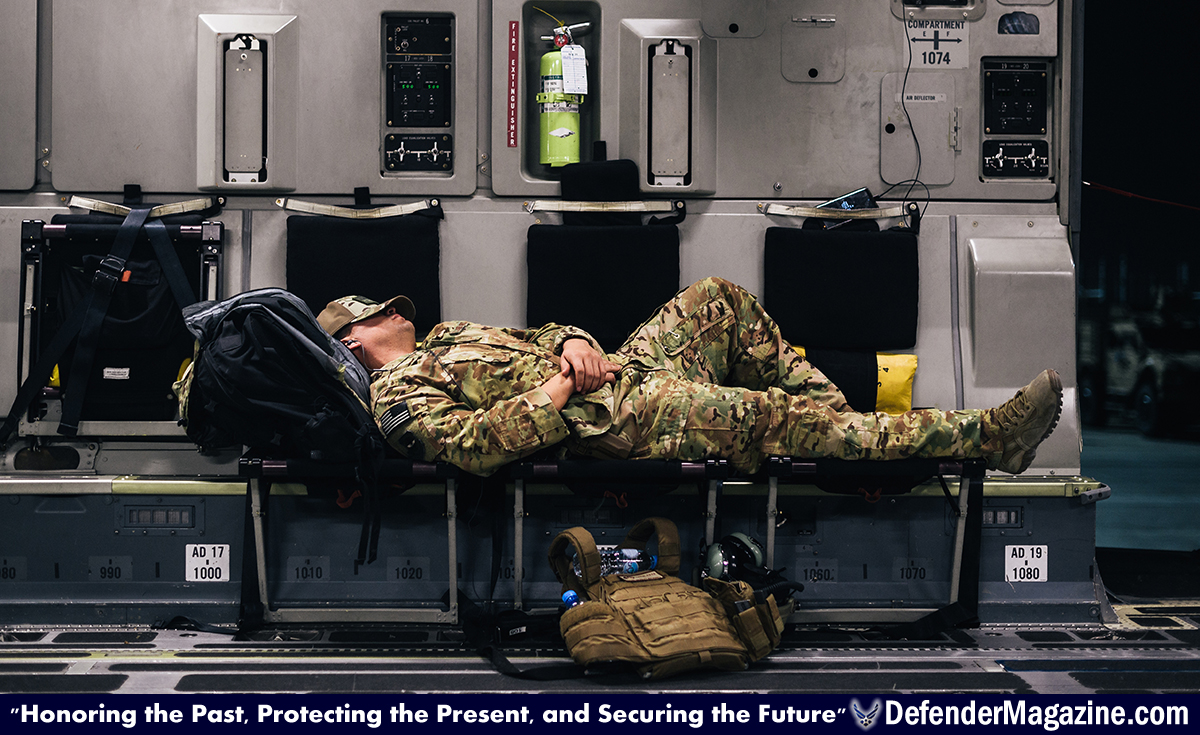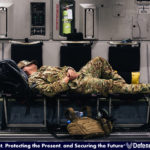FALLS CHURCH, Virginia — The Air Force is studying sleep habits among Airmen to find ways to improve performance and ensure their readiness to support the mission. Researchers with the Air Force Research Laboratory’s 711th Human Performance Wing at Wright-Patterson Air Force Base, Ohio, are looking for ways to better equip Airmen and their leadership with crucial data to ensure that Airmen are getting the necessary rest and to maximize mission execution.
A team of human performance experts is looking at sleep and fatigue from several perspectives. They are tracking sleep habits in pilots and other operators, while also evaluating sleep-monitoring technology to ensure its accuracy and ability to work in an operational setting.
~ ~ ~ ~ ~ ~ ~ ~ ~ ~ ~ ~ ~ ~ ~ ~ ~ ~ ~ ~
Stay up to date on U.S. Air Force Security Forces activities around the world with a subscription to Defender Magazine. TRY our 30-DAY FREE TRIAL by Clicking HERE.
~ ~ ~ ~ ~ ~ ~ ~ ~ ~ ~ ~ ~ ~ ~ ~ ~ ~ ~ ~
“It’s a multi-pronged approach to studying sleep and fatigue,” said Dr. Glenn Gunzelmann, training core technical competency lead for the Airman Systems Directorate in the 711th HPW. “Providing Airmen with information on their sleep patterns and history helps Airmen understand how sleep effects their operational effectiveness. Giving leadership this data also helps inform policy and how to account for sleep needs in their planning.”’
Gunzelmann, along with Lt. Col. Dara Regn, Internal Medicine Branch chief for the U.S. Air Force School of Aerospace Medicine in the 711th HPW, participate in a NATO aircrew fatigue management working group. Regn leads the working group, which also includes Army and Navy researchers. The goal is to pool their expertise and research to address common issues and challenges.
“Our current operations cross over multiple time zones, resulting in circadian rhythm issues, sleep deprivation or insufficient sleep,” Regn said. “As partner nations we all deal with similar challenges like increased mission tempo, long-range missions and pilot shortages. We are working together to optimize our pilots and bring back the importance of sleep.”
This NATO working group is currently building a “sleep toolbox” for aviators and those who take care of them. The toolbox helps them identify and mitigate sub-optimal sleep habits.
According to Regn, the sleep toolbox will have educational resources on fatigue risk assessment with ways to mitigate this. It will also have information on insomnia, including cognitive behavioral therapy for insomnia and other sleep disorders.
“These resources will be made available through an open source NATO website and secure offline application,” Regn said. “The application allows users to optimize their sleep and is a resource for reliable advice on improving sleep quality in operational settings.”
Similarly, the 711th HPW is also developing an application that can track current and future levels of effectiveness base on an individual’s sleep and wakefulness data.
Good sleep habits are closely related to overall health and performance.
“Sleep is an essential life function that many overlook,” Regn said. “Compromised sleep has significant consequences. About 80% of aviation accidents are due to human error, and pilot fatigue accounts for about 15 to 20 percent of that.”
According to Regn, many Airmen do not get enough sleep often due to behavioral factors. The demands of work, family and other responsibilities make getting a good night’s sleep a lower priority. Deployment can also add to sleep challenges.
“Poor sleep quality can be exacerbated by our mission tempo and demands,” Regn said. “In an operational setting, it can be hard to adapt, making it more challenging to complete long-range missions.”
The 711th’s sleep and fatigue research is aimed at equipping the Air Force with the information needed to assess effectiveness, identify risks that may impact the mission, and prevent aviation errors while improving the health and safety of all Airmen.
“Our research, policies and mitigation strategies take into account that these Airmen have lives outside of their operational responsibilities that impact their sleep patterns and can cause fatigue,” Gunzelmann said. “We can equip Airmen with the right information to optimize their sleep habits to enhance health and mission performance.”
By Shireen Bedi, Air Force Surgeon General Public Affairs / Published January 02, 2020
A U.S. Air Force Airman sleeps inside a C-17 Globemaster III during a flight over an undisclosed location in support of Operation Freedom Sentinel, Jan. 22, 2018. Airmen supporting OFS work to prevent Afghanistan from becoming a safe haven for al Qaeda and international extremist groups. (U.S. Air Force illustration)

